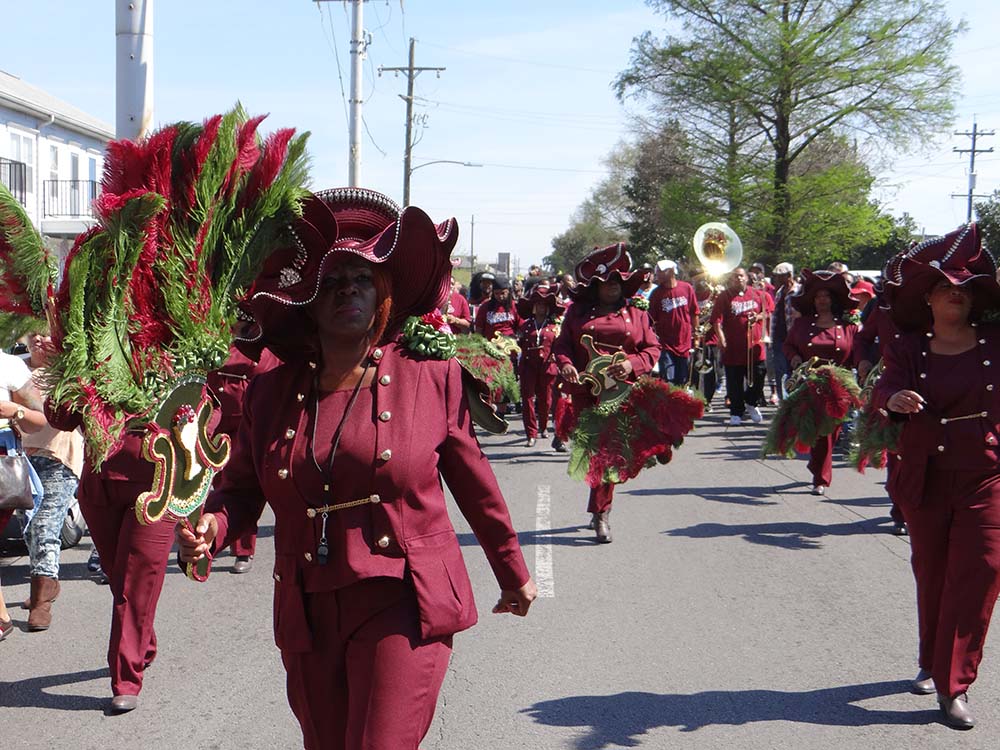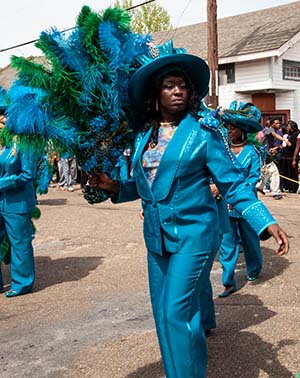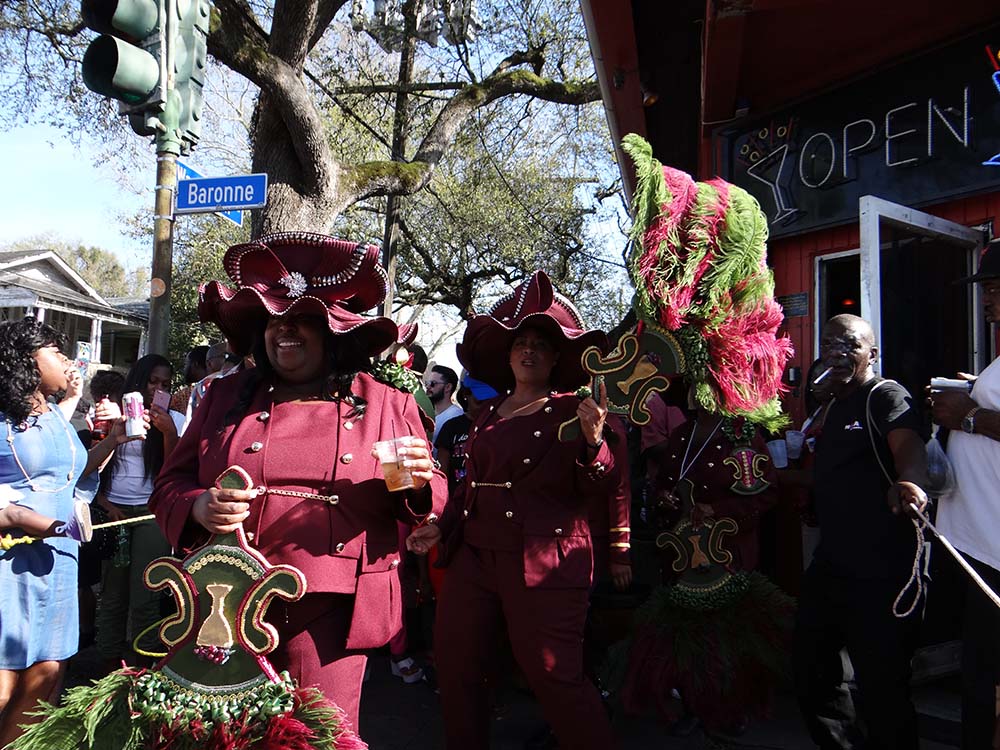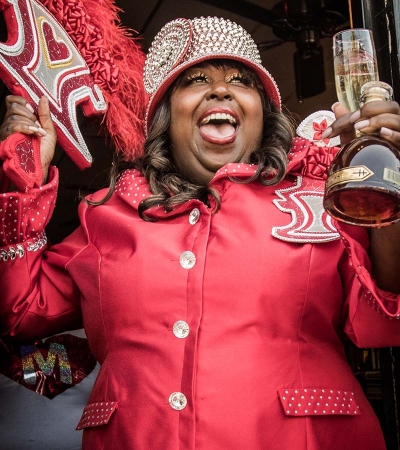
A lot of clubs are known for their shoes. We’re the hat club. Now, our suits and shoes are nice, but hats are our most significant expense. Somebody told us we look like the first ladies from Ebenezer Baptist Church. I said, “Well, that’s a good thing!”

After the parade, sometimes I give my hats away. Some ladies want to be prestigious in church and ask me, “Oh, I need that hat! I can wear it to my church anniversary.” If I get their information, I'll bless them with it. Sometimes I buy an additional hat for somebody who may want it, and I give it to them.
When we first start thinking about our parade, I decide on what I want the theme to be, and then I try to find an outfit to go with my vision. One year, in the representation of a member diagnosed with stage three breast cancer, we made our parade all different shades of pink.
When Trump was elected, we chose the peacock theme to respond to Trump’s public disrespect for women. Our response was not to underestimate women. Women are powerful beings. For centuries, we took a backseat, and men led this country. Even in the second line culture, it was a dominant male assembly. Women would ride as queens. But now you see a movement among women. In 2021, we have more female social aid and pleasure clubs than you have males. It’s our time.
We decided, “Hey, we are proud as a peacock.” We know peacocks are show offs, right? So our suit was a bluish teal turquoise with peacock eye feathers. Our fans had the Styrofoam peacocks on them. But our hat was the most impeccable piece of our regalia with that peacock broach right on the front. I felt like we made a good statement with that. Somebody made peacock headbands for the kids, the honorary members wore jackets with peacock print jackets, and our king and queen matched perfectly. The theme flowed from the front to the back of the parade.
Last year, we wore indigo to match the current mood nationally because of the officer-involved shootings. The officers wore blue, and they were killing our culture, our relatives, and friends, so that's how the indigo color developed. However, it took some time to find embroidered denim fabric with the stitching and detail to make the outfit come together.
Central City Parading
I grew up in Central City. I lived with my mother on Jackson and South Saratoga. My grandmother lived about five blocks away on Josephine and LaSalle and raised me, too. She was primarily a homemaker, but many folks used to get her to do their pressing. My grandmother would also take time to iron sheets! I haven't been on pressed sheets since she's been gone. But, yes, she would iron her bed linens.
My mother was a chef at the Pontchartrain Hotel on St. Charles and Josephine. Along with Chef Louis, she helped put the Mile High Pie idea together. She also worked at English Turn Country Club. So if they have a good relationship with me, most people in the cultural community eat my mother's cooking. And some of them asking: "Do you think your mama will fix this for us?" So my mom has fed many people over the years.
I started elementary school at Lawrence D. Crocker on Marengo, Uptown. From there, I went to Holy Ghost Catholic School, which was close to my house. I went to Rabouin on Carondelet Street for high school. After that, I studied the nursing curriculum, and from there, I went to Delgado Charity Nursing School. Then, after Hurricane Katrina, I did the University of Phoenix for my Masters’ degree in business administration. I then went to the University of Southern California in Los Angeles for a Masters’ in social work.
My house was next to Clay’s Flower Shop, and Bo Dollis and the Wild Magnolias were across the street. People loved to come to our house on Carnival day because they knew my mother cooked elaborate meals—the red beans, yaka mein, hot dogs, hamburgers, jambalaya, fried chicken, barbeque ribs; the whole spread. Also, you wouldn't have to fight for space to watch the Zulu parade because most people are standing on our porch, and we’re elevated. So you got that.
And then you have the most prominent big chief who will come out once the parades pass. Bo Dollis, in his elaborate suits, and everybody waited for that. And, Lord, he can sing. If there’s anything that I enjoyed most, it was when he stepped out and started singing. He had a voice that just resonated with your soul. When that tambourine hit and the first hymn, “Indian Red,” came out of his mouth, we knew it was Mardi Gras morning. Lil Walter Cook with Creole Wild West was a couple of blocks down on Jackson and LaSalle at his mother, Sadie's, Beauty Salon. She used to do my hair. Sometimes, the Wild Magnolias would meet up with them on Jackson. The energy from his people who beat the drums was incredible.
A lot of the Uptown clubs traveled down Jackson Avenue. The Young Men, the Prince of Wales, Scene Boosters, Perfect Gentlemen, the Buck Jumpers came that way because they had watering holes on the avenue. There was Tammy’s Lounge on the corner of Jackson and Danneel. At Jackson and Liberty was Collin’s, and we had the Elks Hall on Jackson. When I was younger, I had to watch from the porch, but my mom loved second lines, too, so if she followed them, I went with her. We would walk the second- lines from start to finish and then walk home.
The first club I joined was the Original Ladies Sequence. They were Uptown, too. I paraded for their 20th anniversary, and the leader at that time decided they were no longer going to be hitting the streets. I wanted to continue the name, but I didn't get that blessing from her, so I started VIP Ladies. We have the Sequence date, which is the first Sunday of March.

My club doesn’t just parade; we empower, motivate, encourage, and nurture our kids’ division. They grew up being taught the culture, but we also encourage them to educate themselves and decide what life is beyond the second line. Second lines were what all my mentees and mentors knew, so I wanted to do more than just parade. We travel. Being in the club allows some of the ladies to see other parts of the world. We've been to the Bahamas and Jamaica. We fundraise so we can take our children on vacation. We bring them to Disney World, bring them to Alabama—whatever is kid-friendly. We try and take them on a summer trip every year.
New Orleans Social and Pleasure Club Task Force
After Hurricane Katrina, I became the New Orleans Social and Pleasure Club Task Force leader, which was an umbrella organization to help advocate for our cultural rights and to advocate for respect from our city council and police department. Before the storm, there was the Second Line Task Force, but it wasn't formal. Individuals had been meeting about banding together because the police would turn the sirens on and run you off the street—and you were paying them! They did a lot of stuff we learned later was not legal. You’ll be paying for ten officers, and two show up, and they still keep your money for ten. It was a lot. After Katrina, the organization became more formal. We had to register with the state, and Fred Johnson, with Black Men of Labor, was like, “The second line is not who we are cause we’re the first line—we're mainline." He was influential in us changing the name, and we end up being the New Orleans Social Aid and Pleasure Club Task Force.
The ReNew New Orleans second line in 2006 was actually on the Bayou Steppers’ Sunday in January. They decided to use their Sunday to bring everybody together, and Michelle Longino coordinated with the Task Force. Initially, we wanted that to happen Uptown, but the city refused to allow us to go. I’m like, “Why?” The excuse was they had some neighborhood conflicts, and they thought the parade would cause more trouble than good. You live, and you learn. I know now that legally they couldn’t do that. We disagreed, but they fought us tooth and nail not to be in Central City, so we ended up in the Tremé community, which made more sense because that’s where our cultural heritage started in Congo Square. The problem was that Tremé didn’t have any businesses open. It was desolate.
In planning it, some of us helped find people somewhere to sleep because there weren’t many hotels up and running. People volunteered in houses that were livable and had lights. We opened our doors to each other. The musicians came in; everybody came from everywhere. They were still in Texas and Alabama and other places they had evacuated to, but they came down for that.
We started at the Backstreet Cultural Museum; we went up both sides of St. Bernard. Kermit was at Sidney’s Saloon down from Victor’s, and we could get some drinks and go to the bathroom in there. Then we went up North Claiborne to Orleans to go up to the Zulu club. People were out with ice chests with water, beer, and wine, but they would give you the water instead of paying the two dollars that's typically charged. I want to say there were six or seven divisions with different bands, and the crowd looked like it stretched more than ten blocks.
It was both a joyful and sad moment because some people went back to their houses for the first time and recognized the damage. One thing that stuck with me with this parade was that people took street signs from fallen poles, carrying street signs from their neighborhood along the parade route. I thought that was such a beautiful thing.
As the parade was finishing, there was a shooting in the crowd. Afterwards, I got a summons from the police department. I got a restraining order—I couldn't host many events, parades, or anything in the city of New Orleans. Although it was a permitted event, Chief Warren Riley said that I endangered the lives of others because they advised me not to have that parade. So you all stamped approval, we paid for the parade, New Orleans Bayou Steppers SAPC, paid the police; however, it didn't have enough for the number of people. But the truth is, you will never have enough. It’s the same as with Mardi Gras parades. It’s never enough to deter the shootings that happen on parade routes. So to put the pressure on us to make sure they had enough police was just ludicrous. That was just impossible.
Katie Schwartzmann, with the ACLU, represented me in court. The judge ruled in my favor again. Unfortunately, it was the same day as Nicola Cotton’s funeral. She was a police officer killed by a mentally ill man, and Warren Riley was in his full regalia in the courtroom. My thought was, “You hate me that bad. You should be at this funeral." I know he could have sent a representative from the department, but he chose to testify. After we won in municipal court, the city attorney filed another petition in Supreme Court against me, where we eventually won again.
We still pay too much money. The permits are based on what is in the parade. The VIP Ladies have trolleys and floats, so I usually spend $3,800 in addition to the support of the Norman Dixon Fund from the Jazz and Heritage Foundation. To put it in perspective, a carnival permit is 750 dollars versus the astronomical fees social aid and pleasure clubs pay. They say the differences are carnival has an ordinance, and we don't. There are so many social and pleasure clubs, and then we’re nine months of the year and carnival's two weeks. After the city's cultural economy office paid half a million dollars for four minutes for a New Year's Eve celebration, it's challenging to adhere to their request. There are struggling artists, musicians, and culture bearers. The city can afford to give them a stipend every month.
While trying to take care of my club, I'm the New Orleans Social Aid and Pleasure Club Task Force president for fifteen years. The governance board includes Byron Hogans and Richard Anderson as vice presidents, and Katie Schartzmann and Allison McCrary sit as legal representatives. Bennie Pete and Walter Ramsey represent the musicians. We serve as the liaisons between the city and the clubs. We fought with Nagin, we fought with Mitch, and now we have Cantrell's administration, and I'm trying not to fight because we've been fighting for a long time. I want to believe in my heart that we can get some medium between the city and the culture bearers that makes sense. Will we ever get there? I hope so.
The End of the 2020 Season
VIP Ladies’ parade was the Sunday after Mardi Gras. Mardi Gras was Tuesday, and that following Sunday, we paraded Uptown. We had a two-week break from second lining because of the carnival season, and before the break, the two clubs that paraded were downtown, so Uptown hadn't had a second line for almost five weeks. People were starving for that Uptown parade.
Our Sunday was big. Single Men and the Dumaine Street Gang rode in the parade. Single Men would celebrate 25 years two Sundays after me, so they were glad they participated in our parade because the stay-at-home order was issued Wednesday before their second line. The last parade that happened was Keep’N It Real downtown because Perry Franklin was the Sunday after me. And after that, the city shut down.
After our parade, some of my members got sick, and they learned that they had the Coronavirus. But at that time, we didn’t know that we exacerbated what Mardi Gras started. I think about that. I thank God that nobody succumbed to it in my club, but I was also heartbroken that Ms. Theresa Elloie passed because we were in her place at Second and Dryades. She was the third stop on our parade. I didn't get sick, but I never had an opportunity to go into the bar because we were picking up another band, and I was trying to make the two divisions. The police were trying to understand what I was doing, so I stayed outside talking to them. I think that’s the only reason why I probably didn’t get it because quite a few people did.
With the pandemic, safety is a priority. As much as we want to parade, we can’t control the number of people who would attend. We can socially distance, the band can socially distance, but those who follow us won’t. They won’t have on masks, they’ll drink and play, and it’s just too risky. We understand that we have to take a backseat for now, but I'm still concerned that sometimes the city can be opportunistic. We have had people who have succumbed to this Coronavirus, so this is serious. We lost Ms. Theresa, Toni from Women of Class, and Mr. Ronald Lewis from the Big Nine. The virus is nothing to take lightly.
Interview conducted by Rachel Breunlin of the Neighborhood Story Project.

